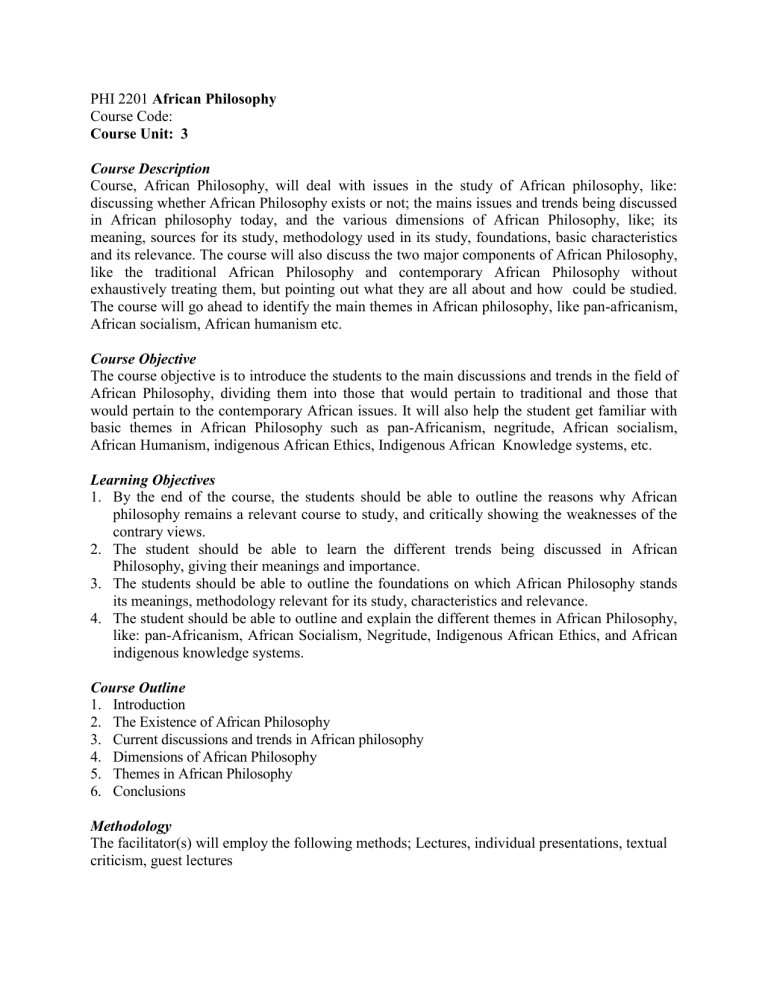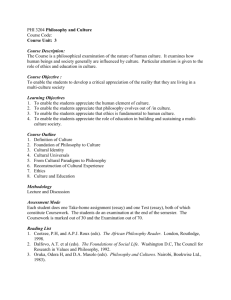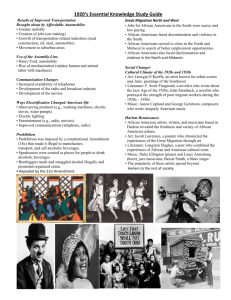PHI 2201 African Philosophy Course Code: Course Unit: 3 Course

PHI 2201 African Philosophy
Course Code:
Course Unit: 3
Course Description
Course, African Philosophy, will deal with issues in the study of African philosophy, like: discussing whether African Philosophy exists or not; the mains issues and trends being discussed in African philosophy today, and the various dimensions of African Philosophy, like; its meaning, sources for its study, methodology used in its study, foundations, basic characteristics and its relevance. The course will also discuss the two major components of African Philosophy, like the traditional African Philosophy and contemporary African Philosophy without exhaustively treating them, but pointing out what they are all about and how could be studied.
The course will go ahead to identify the main themes in African philosophy, like pan-africanism,
African socialism, African humanism etc.
Course Objective
The course objective is to introduce the students to the main discussions and trends in the field of
African Philosophy, dividing them into those that would pertain to traditional and those that would pertain to the contemporary African issues. It will also help the student get familiar with basic themes in African Philosophy such as pan-Africanism, negritude, African socialism,
African Humanism, indigenous African Ethics, Indigenous African Knowledge systems, etc.
Learning Objectives
1.
By the end of the course, the students should be able to outline the reasons why African philosophy remains a relevant course to study, and critically showing the weaknesses of the contrary views.
2.
The student should be able to learn the different trends being discussed in African
Philosophy, giving their meanings and importance.
3.
The students should be able to outline the foundations on which African Philosophy stands its meanings, methodology relevant for its study, characteristics and relevance.
4.
The student should be able to outline and explain the different themes in African Philosophy, like: pan-Africanism, African Socialism, Negritude, Indigenous African Ethics, and African indigenous knowledge systems.
Course Outline
1.
Introduction
2.
The Existence of African Philosophy
3.
Current discussions and trends in African philosophy
4.
Dimensions of African Philosophy
5.
Themes in African Philosophy
6.
Conclusions
Methodology
The facilitator(s) will employ the following methods; Lectures, individual presentations, textual criticism, guest lectures
Assessment Mode
Course work exercises 30%
End of semester examination 70%
Reading list
1.
Mudimbe, V. Y. (1988). The Invention of Africa: Gnosis, Philosophy, and the Order of
Knowledge . Bloomington: Indiana University Press.
2.
Mudimbe, V. Y. (1994). The Idea of Africa. Bloomington: Indiana University Press.
3.
Bodunrin O. Peter, “The Question of African Philosophy”, in
African Philosophy: The
Essential Readings , Paragon House, New York 1991.
4.
Claude Wauthier; The Literature and Thought of Modern Africa: A Survey ; Frederick Prager
Publishers, New York 1967.
5.
Hountondji, Paulin. J. (1983). African Philosophy: Myth and Reality , Bloomington: Indiana
University Press.
6.
Kwasi, Wiredu, (1980). Philosophy and an African Culture . Cambridge: Cambridge
University Press.
7.
Masolo, D. A. (1994). African Philosophy in Search of Identity . Bloomington: Indiana
University Press.
8.
Mosley, Albert G. (1995). African Philosophy: Selected Readings . Englewood Cliffs, New
Jersey: Prentice Hall.
9.
Oluoch, S. Imbo; (1998). An Introduction to African Philosophy . New York: Rowman &
Littlefield Publishers, Inc.
10.
Parker English & Kibujjo M. Kalumba [eds] African Philosophy: A Classical Approach
(1996; Prentice Hall).
11.
Richard Wright [ed.] African philosophy: An Introduction (1984; University Press of
America)
12.
Ruch E. A., and Anyanwu K. C.; African Philosophy: An Introduction to main Philosophical trends in contemporary Africa ; Catholic Book agency, Rome1984.









